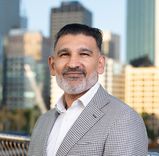
Affy Bhatti
•06 Dec 2023
•10 min read
How Aisha Nancy Novakovich Found a Better Way to Send Blessings Home

Aisha Nancy Novakovich has become one of Australia’s most successful immigrants and an icon of modesty fashion. But it hasn’t always been an easy journey for her.
Aisha’s story starts with her parents, with an Indonesian mother and a Yugoslavian father. They met in fairy tale fashion after her father, who was in Western Australia as a miner, was the neighbour of Aisha’s aunt. He asked her if she had a sister, and when she said that she did, in Indonesia, he took a trip to meet her.
The romance blossomed, but after having Aisha, the young family needed to return to Australia and so, at just six weeks of age, Aisha settled into her new home. Her youth was one where she struggled to bring her Indonesian and Muslim heritage together with her Australian lifestyle, before she was able to find herself and her calling.
Since then, she became an entrepreneur, creative and voice against racism in Australia’s rich multicultural society. Among her many achievements, Aisha successfully founded Modest Fashion Australia (MFA), Secret Sky, and the Global Modest Fashion Association. Thanks to these ventures, she has been able to champion modest and stylish fashion globally. Her work isn’t just a series of business ventures; rather, it has become her way to connect diverse cultures, support local and international designers, and provide a voice for an often underrepresented segment of the fashion industry.
Amid all the incredible work that she does, Aisha has also frequently come up against one of the most frustrating challenges that affect people with family and responsibilities overseas in Australia: the challenge of sending money home.
Aisha’s mother returned to live in Indonesia, but as she has aged, Aisha’s responsibility to her mother has become more pronounced. She is now positioning herself to live between the two countries, travelling constantly and bringing financial support to her family in Indonesia.
As part of that, Aisha is looking to provide money to her family and invest in their home in Indonesia. At one point, during a dry season, Aisha was instrumental in being able to invest in a well, which helped to find water and maintain the local village’s rice paddy.
Additionally, Aisha’s family home in Indonesia - the legacy of her grandparents, is a large, 7-bedroom affair. As the eldest daughter, Aisha feels obligated to assist with the preservation and upkeep of that building, particularly when old age and disabilities have started to make it difficult for the mother to manage herself.
The problem was that transferring money from Australia to Indonesia was both painful and incredibly expensive.
“The exchange rate for the big banks was horrible,” Aisha said. “And not only would they take a massive cut, which was painful enough, but they would also take five working days to make the transfer. It was an insulting level of service.
“The big banks are always ripping migrants off, and they have a bad reputation with us for that reason. We understand the power of the Australian currency in our home countries. Even for small amounts: for example, if someone were to transfer $100, the $10 in fees becomes a big deal by the time it arrives in Indonesia. I hated that on principle, since it meant that instead of being able to give that money to my family – what could have been a week of groceries or more – it was being eaten up needlessly and mercilessly by the big banking corporations. For others, who might only have $100 to spare, it can make all the difference.”
Eventually, Aisha gave up on using Australia’s banks, and instead resolved to bring money to her family by saving it up and bringing large amounts (up to the $10,000 permissible) before converting the Australian dollars into rupiah in Indonesia. But this brought with it a separate set of challenges.
“You feel like the mafia, bringing wads of cash overseas,” Aisha said. “You then have to protect it and feel uncomfortable having all that cash in your bag the whole trip. It would make me so paranoid, and I didn’t even trust the lockers in resorts and hotels.”
The Solution Was A Blessing
Through all of this, Aisha continued to look for a solution. She had a money exchanger in Indonesia that she could trust, but experimented with international payment options outside of the big banks, including the biggest names that well-meaning people often point migrants towards.
It was always the same problem, however. The process was too inconvenient, the fees were excessive, and Aisha’s mother and family were the ones that ultimately lost out in any transaction.
This is why the Bless Payments experience has been such a positive and welcome one. “For example, I was given an exchange rate at 0.9943, which was a massive difference over what the bank would have given me – 0.9463 at the time,” Aisha said.
“Additionally, Bless Payments only required $50 to make a minimum transfer, rather than the $100 that the bank needed. This allowed me to make small transfers more frequently, which has made all the difference.
“Essentially, I now have one fewer thing to think and worry about. It’s not a little thing, either. Whether you’re talking about family or business, removing the hurdles to transferring money overseas is life-changing in what it opens up.
As Aisha said, one of the unfortunate things about the financial system in Australia is that it does lead migrants to feel like they’re getting the short end of the stick. She cares deeply about bridging cultures, and believes that people shouldn’t be punished for trying to share blessings with family overseas.
That is ultimately why Aisha was so happy with her encounter with Bless Payments. It represents not only the power of innovative solutions to facilitate better financial transactions, but also as a disruptive force in the market, it helps amplify marginalised voices and allow migrants to feel more welcome in their adopted homes.
Aisha’s background
- Migrated to Australia at six weeks old.
- Grew up in Coober Pedy, South Australia until aged 7, then moved to Adelaide and finally Perth.
- Is a devout Muslim, and anti-racism advocate.
- Majored in Political Science and English (with Honors in Feminist Literary Criticism).
- Founded multiple companies: Modest Fashion Australia (MFA) and Secret Sky
- Helped launch the Global Modest Fashion Association in Indonesia.
- Continues to support Indonesian artists and fashion designers, while also supporting initiatives in Australia, such as The Ramadan Iftar Aboriginal - Muslim Historical Relations.
Why Aisha’s migrant journey has been so inspiring
Aisha’s journey from the multicultural roots of Indonesia and Yugoslavia to becoming an icon of modesty fashion in Australia is a testament to her resilience and determination. After struggling to find her sense of place and self through her youth, Aisha has since become a champion that is truly bringing Australia and its largest neighbour together.
It has never been an easy journey, and Aisha is a testament to the resilience that all migrants need. In addition to handling the racism and discrimination that Muslim Australians face, Aisha has had to struggle with a system that is poorly equipped to handle people who have their lives split between multiple countries. For Aisha, who moves between Australia and Indonesia, simple things, like transferring money, offer a level of stress that most Australians will never have to manage.
But she has persisted and her contributions to both nations has been significant. Aisha represents the model of an Australian immigrant who not only has successfully found her way into in Australian society, but has done so without ever losing sight of her heritage.
1200 views
Recent Posts
See All



